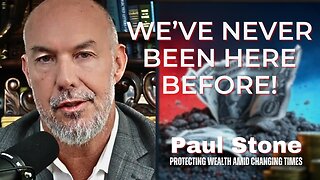Premium Only Content

Episode 1219: Ancient Heresies that are still around today
The Catholic Church has a long and rich history that spans over two millennia. Throughout its existence, the Church has encountered various challenges and controversies, including the rise of heretical movements. These heresies challenged the established doctrines and teachings of the Church, leading to significant theological debates and, at times, even schisms.
Here are five ancient heresies that the Catholic Church had to confront:
Arianism: Arianism was a significant heresy that emerged in the 4th century and was named after its founder, Arius, a priest from Alexandria. Arianism denied the divinity of Jesus Christ, teaching that He was a created being and not co-eternal with God the Father. This heresy threatened the orthodox understanding of the Trinity and the nature of Christ. The Church, particularly through the Council of Nicaea in 325 AD, condemned Arianism as a heresy and affirmed the belief in the consubstantiality of the Father and the Son.
Gnosticism: Gnosticism was a diverse movement that arose in the 1st and 2nd centuries AD, blending elements of various religious and philosophical traditions. Gnostics claimed to possess secret knowledge (gnosis) that allowed them to achieve spiritual salvation and liberation from the material world. They rejected the goodness of the physical creation, denied the incarnation of Christ, and taught a dualistic view of the universe. The Church Fathers vigorously opposed Gnosticism, highlighting its contradictions with the teachings of Scripture and the apostolic tradition.
Nestorianism: Nestorianism emerged in the 5th century and was associated with Nestorius, the Patriarch of Constantinople. Nestorius advocated a divisive view of the Incarnation, separating the divine and human natures of Christ to such an extent that he effectively proposed two separate persons: one divine and one human, united in moral cooperation. The Church condemned Nestorianism as a heresy, affirming the unity of the divine and human natures in the person of Jesus Christ, known as the hypostatic union.
Monophysitism: Monophysitism, which originated in the 5th century, rejected the Chalcedonian definition of the two natures of Christ—human and divine—coexisting in perfect unity. Monophysites claimed that Christ had only one nature, a divine one, in which the human nature was entirely absorbed. This heresy threatened to undermine the orthodox understanding of the Incarnation. The Church, through subsequent councils, defended the Chalcedonian definition and reaffirmed the belief in the two natures of Christ.
Pelagianism: Pelagianism arose in the 5th century and was associated with the teachings of Pelagius, a British monk. Pelagius emphasized human free will and denied the doctrine of original sin, asserting that individuals could achieve salvation through their own efforts and moral goodness alone, without the need for divine grace. The Church rejected Pelagianism as a heresy, reaffirming the role of divine grace in the process of salvation and the fallen state of humanity.
These heresies, among others, posed significant challenges to the Catholic Church throughout its history. The Church responded by convening ecumenical councils, relying on the writings and teachings of the Church Fathers, and clarifying its doctrines to defend the orthodox faith. These efforts were crucial in preserving the integrity and unity of the Catholic Church and its teachings.
While the ancient heresies I mentioned have been historically significant, their direct influence and existence as distinct movements have diminished over time. However, certain remnants or ideas reminiscent of these heresies can still be found in some contemporary religious and philosophical contexts. It's important to note that the vast majority of Christians, including Catholics, reject these heresies and adhere to the orthodox teachings of the Church.
While the ancient heresies I mentioned have been historically significant, their direct influence and existence as distinct movements have diminished over time. However, certain remnants or ideas reminiscent of these heresies can still be found in some contemporary religious and philosophical contexts. It's important to note that the vast majority of Christians, including Catholics, reject these heresies and adhere to the orthodox teachings of the Church.
Elements resembling Gnostic thought can be seen in some modern New Age or esoteric spiritual movements that emphasize secret knowledge and spiritual enlightenment. Additionally, certain fringe groups may exhibit elements of Nestorian or Monophysite tendencies, although they would generally not be recognized as mainstream or orthodox Christian communities.
Moreover, various theological misunderstandings or misinterpretations can occasionally echo the teachings of the ancient heresies. For example, some individuals may struggle with understanding the delicate balance between human free will and God's grace, which can inadvertently lean toward a Pelagian perspective.
It's essential to approach these topics with nuance and recognize that contemporary expressions may differ significantly from their historical counterparts. The Catholic Church, along with other Christian denominations, continues to address and provide guidance on theological matters to prevent the resurgence of ancient heresies and maintain fidelity to orthodox Christian beliefs.
Gnostic Influences: Although not in the exact historical sense, elements resembling Gnostic thought can be seen in some modern spiritual movements. These may include New Age philosophies, esoteric beliefs, or syncretistic practices that emphasize hidden knowledge, personal enlightenment, and the rejection of the material world. These movements often promote the idea that individuals can attain spiritual salvation or transcendence through esoteric teachings or practices, bypassing traditional religious frameworks.
Nestorian and Monophysite Tendencies: While Nestorianism and Monophysitism, as specific heresies, are not widely present today, some fringe groups or sects may hold beliefs that resemble certain aspects of these ancient heresies. For example, some communities may have a flawed understanding of the nature of Christ, either exaggerating the separation between His divine and human natures (Nestorian tendency) or merging the two natures to the point of obscuring their distinction (Monophysite tendency). These deviations often occur outside mainstream Christian orthodoxy.
Pelagian-like Perspectives: Although most Christian denominations, including the Catholic Church, explicitly reject Pelagianism, certain theological misunderstandings or misinterpretations can occasionally echo Pelagian tendencies. Some individuals may struggle with understanding the balance between human free will and God's grace in the context of salvation. This can lead to an overemphasis on personal efforts, moral achievements, or self-reliance, potentially downplaying the necessity of divine grace for salvation.
Moreover, various theological misunderstandings or misinterpretations can occasionally echo the teachings of the ancient heresies. For example, some individuals may struggle with understanding the delicate balance between human free will and God's grace, which can inadvertently lean toward a Pelagian perspective.
It's essential to approach these topics with nuance and recognize that contemporary expressions may differ significantly from their historical counterparts. The Catholic Church, along with other Christian denominations, continues to address and provide guidance on theological matters to prevent the resurgence of ancient heresies and maintain fidelity to orthodox Christian beliefs.
So when people tell you to live and let live or “you do you” how is that view according to the teachings of the church?
When considering the question of why Christ would want His followers to fight heresies aggressively, it is important to understand the nature of heresy and its potential impact on the integrity of Christian faith and the well-being of believers. Here are a few reasons that shed light on the importance of combating heresies:
Protection of Truth: Jesus identified Himself as "the way, the truth, and the life" (John 14:6), and His teachings are considered the foundation of Christian faith. Heresies distort or deny essential truths of the faith, which can lead people astray from the authentic message of Christ. Aggressively combating heresies is necessary to protect the integrity and purity of the truth revealed by Christ and safeguard the faithful from doctrinal errors that could harm their spiritual well-being.
Preserving Unity: Heresies can create divisions within the Christian community. When false teachings gain traction, they can lead to schisms and the formation of separate groups or sects that deviate from the broader body of believers. Aggressive opposition to heresies helps to maintain the unity of the Church, as it seeks to correct and prevent theological fragmentation, ensuring that believers remain united in the common faith.
Safeguarding Salvation: Certain heresies distort or undermine key aspects of Christian soteriology—the doctrine of salvation. Christ's redemptive work on the cross and the role of divine grace are central to the Christian understanding of salvation. Heresies that diminish the necessity of God's grace or promote a works-based salvation can lead people away from the true path to salvation. By combating heresies, the Church seeks to protect believers from being misled into false paths that could jeopardize their eternal destiny.
Fidelity to Christ's Authority: Jesus entrusted His teachings and the responsibility of safeguarding the faith to His apostles and their successors. In fulfilling this mandate, the Church has the duty to preserve and transmit the authentic deposit of faith faithfully. Aggressively fighting heresies demonstrates a commitment to upholding the authority of Christ and His teachings, ensuring that His message remains untainted by distortions and false interpretations.
Love and Care for Others: Aggressively combating heresies is an expression of love and care for others. The Church, guided by Christ's example, desires the spiritual well-being of all believers and seeks to protect them from the confusion and potential harm that heresies can bring. By challenging false teachings, the Church aims to steer individuals back to the truth, enabling them to experience the fullness of the faith and the transformative power of a genuine relationship with Christ.
It is important to note that while the Church opposes heresies, the approach to combating them should always be rooted in love, respect, and a desire for reconciliation. The goal is not to condemn individuals but to correct errors, guide them back to the truth, and foster unity within the body of Christ.
It is important to approach the question with sensitivity, recognizing that discussions about sin and charitable action can be nuanced and complex. The Catholic Church, for instance, views heresy as an error or deviation from the orthodox teachings of the faith. Here are some points to consider regarding the Church's perspective on allowing the practice of heresies:
Preserving Truth and Salvation: The Catholic Church sees its mission as preserving and proclaiming the truth revealed by Christ. Allowing the unchecked practice of heresies may lead to confusion and the distortion or dilution of essential truths. From the Church's perspective, failing to address heresies could hinder the salvation of souls by potentially leading them away from the fullness of truth and the means of grace necessary for salvation.
Responsibility to Teach and Correct: The Church has a responsibility to teach and guide its members in the authentic teachings of the faith. Allowing the practice of heresies without challenge would undermine this responsibility and could be seen as a failure to fulfill the mandate to proclaim the Gospel and correct error. The Church seeks to help individuals recognize and correct their misunderstandings, steering them back to the true teachings of Christ.
Duty to Protect the Faithful: The Church has a duty to protect the spiritual well-being of its members. Allowing the practice of heresies unchecked could expose believers to false teachings that may lead them astray or harm their relationship with God. The Church's opposition to heresy is motivated by a desire to safeguard the faithful from potential spiritual dangers and to promote their growth in genuine faith and holiness.
The Sin of Scandal: Allowing the open practice of heresies can create scandal within the Christian community. Scandal occurs when the actions or teachings of one person lead others into error or confusion. The Church aims to prevent scandal and maintain the integrity of the faith by addressing and correcting false teachings promptly and decisively.
The Call to Charity: Charity, understood as the love of God and neighbor, is a central virtue in Christian teachings. While challenging heresies may seem confrontational, the intention behind such action is rooted in genuine love and concern for others. By opposing heresies, the Church seeks to protect individuals from spiritual harm and guide them toward the truth that leads to authentic communion with God and the fullness of life in Christ.
It is crucial to approach these matters with humility, understanding that the Church's stance on heresy is based on its theological framework and commitment to the preservation of truth and the salvation of souls.
-
 1:50:28
1:50:28
Jesús Enrique Rosas
4 hours agoEp. 51: Gates wants CENSORSHIP, Colbert MESSES UP, AOC meltdown, Hanks LEAVING and MOAR!
48.5K17 -
 1:45:47
1:45:47
The Quartering
6 hours agoHuge Censorship Law To Pass, Trump Endorses Johnson, TikTok is Saved? & Today's News!
71K59 -
 53:39
53:39
PMG
3 days ago $0.35 earned"Allegations Against Diddy & Usher, $150K Bounty on Trump, RINO Speaker Caves w/Steve Baker"
1.01K -
 1:31:21
1:31:21
Tucker Carlson
5 hours agoBrigham Buhler: UnitedHealthcare CEO Assassination, & the Mass Monetization of Chronic Illness
158K202 -
 2:29:04
2:29:04
Nerdrotic
6 hours ago $9.80 earnedHappy New Years - Nerdrotic Nooner 454
62.3K12 -
 32:20
32:20
Rethinking the Dollar
5 hours agoThe U.S. Debt Crisis That Was "Made In America" w/ Paul Stone
44.1K10 -
 3:31
3:31
SLS - Street League Skateboarding
1 day agoCoco Yoshizawa’s 3rd Place Finish at SLS Tokyo 2024 | Best Tricks
50.4K5 -
 46:15
46:15
Grant Stinchfield
1 day ago $12.15 earnedNew: The COVID Cover-up Revealed! Team Biden Caught in a Big Lie!
46.6K18 -
 2:35:08
2:35:08
The Shannon Joy Show
19 hours ago🔥🔥LIVE Exclusive W/Daniel Horowitz - New Year 2025 Analysis On Culture, Economy & Politics🔥🔥
54.2K17 -
 33:14
33:14
Tudor Dixon
5 hours agoThe World Walk with Tom Turcich | The Tudor Dixon Podcast
36.5K2